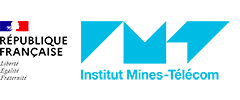
Assistant/Associate Professor in mobile networks experimental design and validation: application to open source platforms
- On-site
- Palaiseau, Île-de-France, France
- Réseaux et Internet des objets
Job description

Who are we?
Télécom Paris, a school of the IMT (Institut Mines-Télécom) and a founding member of the Institut Polytechnique de Paris, is one of France's top 5 general engineering schools.
The raison d'être of Télécom Paris is to train, imagine and undertake to design digital models, technologies and solutions for a society and economy that respect people and their environment.
Télécom Paris is positioned as an open-air laboratory for all the major technological and societal challenges: artificial intelligence, quantum computing, IOT, cybersecurity, major digital facilities (Cloud), 5G/6G, Green IT.
The field of cellular mobile networks is facing major scientific challenges to make 6G a reality. The definition of 6G is the subject of much debate worldwide, as it represents a sovereignty issue. The objectives of a new generation have yet to be clarified, between the proponents of ever more (more throughput, more responsiveness, more reliability) and those of a paradigm shift (6G could mark the advent of an “Internet of the senses”). In all cases, this future technology will represent a major disruption with previous generations. Whether in terms of promised performance (throughput, reliability, delay, energy efficiency) or paradigm shift, 6G will require a totally new radio interface. First of all, a new physical layer and new access techniques will have to be defined. Existing approaches are no longer sufficient. Future networks will have to operate on very high carrier frequency bands (subTHZ and THZ bands), characterized by high channel directivity and the end of the cellular concept.
Existing approaches to radio resource management, mobility control and scheduling will also need to be completely rethought, with a strong AI component. In some cases, joint communication and detection techniques may also prove useful. These technologies are currently being evaluated by the scientific community in terms of throughput, latency, reliability and energy efficiency.
The environmental impact of the future 6G will also be a major issue, which the scientific literature has not yet fully answered for current systems.
From an architectural point of view, mobile networks have gradually evolved towards strong virtualization and decentralization of network functionalities, both in radio access (e.g., C-RAN, V-RAN, O-RAN) and in the edge/core of the network. On the one hand, virtualization enables optimal reuse of resources (radio, computation, distributed storage) using advanced techniques such as network slicing and RAN splitting, service placement and distributed storage. At the same time, the softwarization of network functions will enable a very rapid acceleration in the evolution of services offered by network operators and service providers.
On the other hand, future challenges include cybersecurity (e.g., shared access to user data), the feasibility of executing and placing virtualized functions with guaranteed very high throughput and very low latency, and the definition of deployment strategies on the 6G infrastructure that take into account a real reduction in time-to-market.
The industrial stakes of 6G are huge, as are the future financing and design challenges. Telecom Paris has always been, and must continue to be, a magnet for network research, especially for these future mobile systems, which represent a major challenge for national and European digital sovereignty.
In this context, scientific societies require more and more experimental validation of concepts (ACM, IEEE) and reproducibility of experiments. A large scientific community has emerged around the open source for mobile systems (SRSRAN, OAI, Open5GS, Gnuradio) and has developed major international experiments platforms. The aim for Telcom Paris is to become a major player in this community. Telecom Paris has designed a complete 5G/cellular IoT testbed that has proven its efficiency and relevance in the past years. A new challenge will be the integration and the interconnection with SLICES-RI European research platform and SLICES-FR national cluster. The platform should be able in a near future to address advanced use cases such as 5G NTN and RIS. The selected candidate will participate in the scientific and technical animation of the platform, in cooperation with the existing research team, and under the supervision of the scientific responsible of the platform.
Your main tasks will be to:
- Design and implement teaching in your scientific field
- Conduct research in your scientific field
- Develop and maintain partnerships, collaborations and contractual relations in your scientific field.
Job requirements
This position is aimed at a scientist with a PhD or equivalent, who is looking to develop and establish his/her research expertise while also wishing to develop and evolve his/her teaching skills.
Above all, the position requires in-depth expertise in mobile radio interfaces, both architecturally and protocol-wise, as well as in associated open source experiments and developments (Open Air Interface, SRSRAN, Gnuradio, UHD). A practical command of the software-defined radio and O-RAN paradigms is essential, as the work carried out in this context will have a strong experimental dimension (Telecom Paris 5G/6G platform, PEPR 5G, BPI projects, SLICES-FR project, 6G SRIA, etc.).
Solid skills in network modeling and architecture are also required. In addition, a good command of virtualized architectures (cloud and Edge systems) as well as very high-speed programmable networks would be an asset. Familiarity with Amarisoft environments would be an added advantage.
Why join us?
If you are passionate about innovation, research and teaching, and would like to join a dynamic and collaborative team, we would be delighted to receive your application.
You'll be working in a fast-growing, pleasant, green and accessible environment (particularly for people with disabilities) just 20 km from Paris (at 45min from Paris by public transport). You will benefit from :
49 days' annual leave (CA + RTT)
Flexible working hours (depending on the department's activity)
Teleworking 1 to 3 days/week possible
75% reimbursement of public transport season ticket
Proximity to numerous sports facilities, concierge service, underground car park, in-house catering, etc.
Staff association at school and department level
Good to know: our social security contributions are lower than in the private sector
Selection: The selection process takes place in 4 stages:
- Pre-selection of candidates by the reception team
- Pre-interview with Human Resources
- Hearing by the recruitment committee and ranking of successful candidates
- Final interview with the Director of Télécom Paris
Additional information :
Application deadline: 03 march 2025
Type of contract: Permanent
Contact : Philippe Martins (martins@telecom-paris.fr)
Full job description : https://partage.imt.fr/index.php/s/ZAP4TATX6RkZ3FL
Telecom Paris is an equal-opportunity employer.
All our positions are open to individuals with disabilities.
or
All done!
Your application has been successfully submitted!
